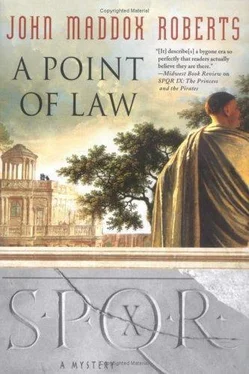John Roberts - A Point of Law
Здесь есть возможность читать онлайн «John Roberts - A Point of Law» весь текст электронной книги совершенно бесплатно (целиком полную версию без сокращений). В некоторых случаях можно слушать аудио, скачать через торрент в формате fb2 и присутствует краткое содержание. Год выпуска: 0101, ISBN: 0101, Издательство: St. Martin, Жанр: Исторический детектив, на английском языке. Описание произведения, (предисловие) а так же отзывы посетителей доступны на портале библиотеки ЛибКат.
- Название:A Point of Law
- Автор:
- Издательство:St. Martin
- Жанр:
- Год:0101
- ISBN:9780312337254
- Рейтинг книги:5 / 5. Голосов: 1
-
Избранное:Добавить в избранное
- Отзывы:
-
Ваша оценка:
- 100
- 1
- 2
- 3
- 4
- 5
A Point of Law: краткое содержание, описание и аннотация
Предлагаем к чтению аннотацию, описание, краткое содержание или предисловие (зависит от того, что написал сам автор книги «A Point of Law»). Если вы не нашли необходимую информацию о книге — напишите в комментариях, мы постараемся отыскать её.
A Point of Law — читать онлайн бесплатно полную книгу (весь текст) целиком
Ниже представлен текст книги, разбитый по страницам. Система сохранения места последней прочитанной страницы, позволяет с удобством читать онлайн бесплатно книгу «A Point of Law», без необходимости каждый раз заново искать на чём Вы остановились. Поставьте закладку, и сможете в любой момент перейти на страницу, на которой закончили чтение.
Интервал:
Закладка:
“And,” Nepos said pitilessly, “yet another plot on behalf of a twelve-year-old boy? And concocted by a Julian woman?” He turned to Father. “Cut-nose, maybe we’d be best advised to get up there, declare him insane, and hustle him out of Rome as quickly as possible.”
“Nonsense,” Cato said, calmly for once. “I’ve seen him like this before. He’ll get over it. Decius, forget all this drivel, even if it’s true. You have no evidence, no witnesses. For legal purposes, none of it happened. We’ll do this the old-fashioned way, the way our ancestors did it.” This, for Cato, being the ultimate encomium for anything at all.
Pompey pushed his way through to us, the soldiers parting before him by sheer habit.
“What is the meaning of this?” he demanded. “As if that absurd demonstration yesterday wasn’t enough, now I have two packs of thugs elbowing each other in the Forum!”
“Two?” I said. Then, “Oh, I suppose Curio is here. Don’t worry about these soldiers, Proconsul. They’ll disperse as soon as the trial is over. Curio’s lot you are going to have to contend with for a while, I fear. When I have time a little later I’ll tell you all about Pisistratus.”
“Pisistratus! The tyrant of Athens? Cut-Nose, is your son completely crazy?”
“We’ve been discussing that very possibility, Proconsul, but Cato is of the opinion that it’s a passing phase. I myself am not so sure.”
Pompey shrugged. “Well, being mad never stopped anyone from being elected praetor before this. But I’ll not have a great show of force here in the Forum on the day before the election.”
“We’re Metelli,” said Creticus, “not Claudians or Antonii or any other sort of congenital criminals. We’ll do this the proper way and abide peacefully by the decision of the court.”
“See you do. I’m going to go talk with Curio now, and see if I can get him to disperse his gang. Pisistratus, indeed!” He bustled off, and I could understand his anger. For a year his proudest boast had been that he had cleared Rome of the criminal-political gangs that had plagued us for generations. Now it looked as if his good work was being undone.
The bleachers were now almost full, my jury, each man wearing the narrow purple stripe and gold ring of his equestrian status, taking his place. They were a prosperous-looking lot, wealthy and usually self-made. Such men could be counted on to dislike an aristocrat like me. On the other hand, they had little love for the Clodian rabble. We were even there.
The Tribunes of the People were seating themselves, arranging their plain togas, which lacked the purple border despite their great power. Their tunics likewise lacked the senatorial stripe, although they could attend Senate meetings and interpose their veto there. They would enter the Senate as full members in the following year.
As the tribunes sat I identified them and almost reflexively rated each according to the political obsession of the day. From the left: Caelius, pro-Caesar; Vinicius, pro-Caesar; Vibius Pansa, pro-Caesar; Cornelius, pro-Caesar; Nonius, pro-Caesar; Minucius, anti-Caesar; Didius, anti-Caesar; Antistius, anti-Caesar; Valerius, anti-Caesar and, last of all on the right end of the bench, that unknown quantity, Publius Manilius.
When all were present, Manilius stood and gestured for silence. Gradually, the babble of the multitude was stilled.
“Citizens!” he began. “I, Tribune of the People, Publius Manilius Scrofa, declare these proceedings to be open. In the contio of the Plebeian Order, this matter was deemed worthy of trial before the comitia tribute and thus we shall proceed.
“The accused”-here he gestured in my direction-“is Decius Caecilius Metellus, a senator of Rome, charged with the murder of Marcus Fulvius, citizen of Rome, formerly resident in Baiae, at the time of his death dwelling in the Temple of Tellus district. Is the defense ready to present opening arguments?”
“We are!” Father shouted.
“Then ascend the podium and address the people of Rome.”
We climbed the steps in stately fashion; a gaggle of Metelli, along with Cato and a number of prominent men, some of them exconsuls, to attest to my character.
“Who speaks for you?” Manilius demanded.
Cato stepped forward. “I am Senator Marcus Porcius Cato, a friend of the accused, and I will prove his innocence of these base charges.”
“Proceed,” said Manilius. He pointed to the slave who stood by the old bronze water clock. The man pulled out its stopper and water began to drain into a large glass beaker that was graduated to reveal the passing minutes. Opening arguments would be over as soon as the beaker was full. A good Roman lawyer could time his argument to the syllable.
“First,” Cato began, “I must protest this wretched, unconstitutional trial. The contio that called for it was informal, and there were no sacrifices. Auguries were not taken. The gods of the state were not called upon to witness, and so it is invalid. The comitia tributa has no power to try a capital case, and I assure everyone here that that is just what they will try to make of it!” Cato had an unpleasant voice, but he also had a masterful command of a sort of old-fashioned, almost sacerdotal Latin that was extremely impressive in events of this nature. He completely eschewed the florid, embroidered rhetoric practiced by Hortalus.
Then Cato launched into his oration. He spoke of the glory of my family, naming its many censors, consuls, and praetors, and of the battles won by Metellan generals. He spoke of my early career, of my service in the rebellion of Sertorius, in the suppression of the Catilinarian conspiracy, in the war in Gaul, most recently in my little campaign that very year against an outbreak of piracy near Cyprus.
He then launched into my political career, citing my many investigations against criminals and criminal activities, my quaestorship, during which I had infiltrated Catilina’s ranks, my unprecedented double aedileship, when I had not only cleaned up the streets and sewers, but had vigorously prosecuted the crooked building contractors whose shoddy practices had cost so many citizens lives (nobody counted the dead slaves and foreigners). He cited the games I had celebrated, including the funeral games for Metellus Celer, at which I had presented a munera where an uncommon number of famous champions had come out of retirement to fight. Milo had been responsible for this, but I got the credit. There were murmurs of appreciation from the crowd. Everybody had loved those games.
When the beaker was full, Cato stopped and my character witnesses came forward. Some swore before all the gods that I was as virtuous a Roman as any since Numa Pompilius. All swore that I was incorruptible (actually, few people had considered me worth corrupting). All extolled the worthiness of my ancestors. Those who had been praetors told of important investigations I had undertaken for them. At one time I had been something of a professional iudex .
Then Cato resumed his oration. The water clock was reset for this phase, always the most enjoyable part of a trial: denunciation of the other side.
“Who,” cried Cato, “was this Marcus Fulvius? He was a nobody from nowhere. He was a resident, not of Rome, but of Baiae, that sordid cesspool of every sort of luxury, vice, and perversion! Can there be any doubt that Marcus Fulvius was himself the very embodiment of all that is vile, disgusting, and un-Roman? Citizens! Did you all not, just yesterday, see that insolent fool’s own sister, the most notorious whore in Rome, climb upon the Rostra-that monument of our ancient greatness-and put on the most unholy, scandalous, and lascivious display ever to offend the eyes of the public?” At this the audience cheered and whistled. “Has Rome seen so horrid a woman since Tullia ran over her own father with a chariot?”
Читать дальшеИнтервал:
Закладка:
Похожие книги на «A Point of Law»
Представляем Вашему вниманию похожие книги на «A Point of Law» списком для выбора. Мы отобрали схожую по названию и смыслу литературу в надежде предоставить читателям больше вариантов отыскать новые, интересные, ещё непрочитанные произведения.
Обсуждение, отзывы о книге «A Point of Law» и просто собственные мнения читателей. Оставьте ваши комментарии, напишите, что Вы думаете о произведении, его смысле или главных героях. Укажите что конкретно понравилось, а что нет, и почему Вы так считаете.









